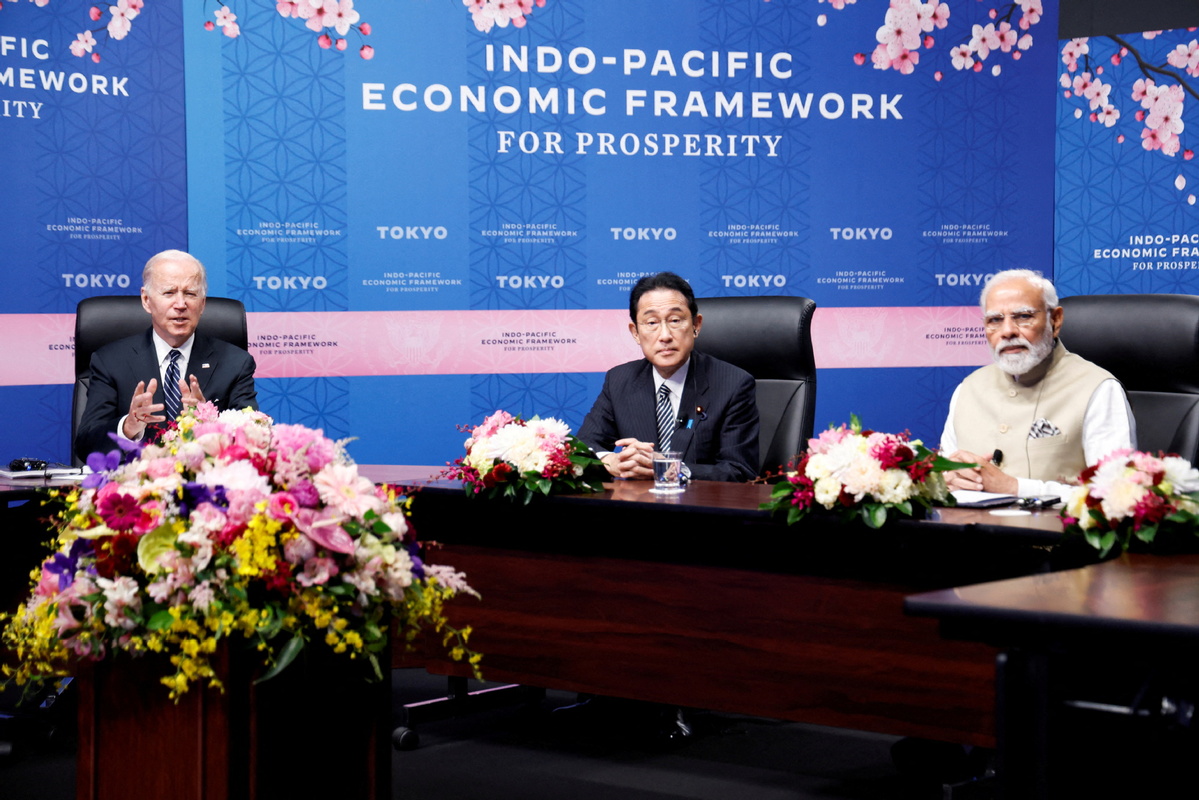Biden sharpens Indo-Pacific focus with pact


In Tokyo, US leader positions IPEF as means to boost trade amid skepticism
US President Joe Biden on Monday unveiled an ambitious attempt to enhance the United States' economic ties with Asian countries as he launched the Indo-Pacific Economic Framework, or IPEF, in Tokyo alongside Japanese Prime Minister Fumio Kishida.
"We're here today for one simple purpose: The future of the 21st century economy is going to be largely written in the Indo-Pacific. Our region, "Biden said on his first trip to Japan as president, adding that "this framework should drive a race to the top".
The IPEF, for which the US began talks with Indo-Pacific countries late last year, had initially faced resistance from some countries because the framework would not grant them access to the US market.
However, US officials have insisted that the initiative represented "a new approach to cooperation that moves beyond a traditional trade agreement".
On Monday, Biden said the framework was joined by 12 other nations. Aside from India and four US allies, Japan, South Korea, Australia and New Zealand, there are seven nations from the 10-member Association of Southeast Asian Nations: Brunei, Indonesia, Malaysia, the Philippines, Singapore, Thailand and Vietnam. The White House said the countries together represent about 40 percent of global GDP.
Jake Sullivan, the US national security adviser, said the Indo-Pacific was projected to be the biggest driver of global growth for 30 years.
According to the White House, the IPEF contains four pillars: Improving the resiliency of supply chains; cooperation on digital trade; ramping up clean energy and infrastructure; and enhancing tax and anti-corruption.
The Financial Times reported that the US agreed that the IPEF members could choose how many of the four pillars they wanted to join as a concession that helped bring to the table nations that were skeptical about the deal. But Washington hoped to finalize agreements for each pillar within 12 to 18 months, and that deals on one or more pillars could be concluded before agreement on the remaining ones.
"The IPEF is limited by the domestic politics of trade in the United States because what countries in Asia want is exactly what Biden cannot give and that is greater access to the US market," said Liu Qingbin, a former professor at the Institute of Advanced Sciences at Yokohama National University in Japan and now senior researcher at the China Digital Economy Institute.
'All guns but no butter'
According to Liu, the IPEF is meant to help blunt criticism that Biden's Indo-Pacific strategy is "all guns but no butter", meaning his approach in the region has been too focused on security and lacked an economic component.
"But given that the US quit the Trans-Pacific Partnership in 2017 and Washington's unwillingness to join the rebranded Comprehensive and Progressive Agreement for Trans-Pacific Partnership", Biden has not convinced Asian countries that the initiative "will be durable", Liu said.
Masanari Koike, a visiting fellow at Tsinghua University and former member of Japan's House of Representatives, said the US has been driven by security and economic reasons as Washington is eager to have a framework in the region under its own leadership.
Adding that the US has been concerned about China's increasing influence in the region, Koike said the IPEF does not amount to an agreement and "thus does not have strict obligations or enforcements", but it is still meaningful, Koike said.
"By joining the framework Japan should seek its own national benefits, but should have the expectation of a prolonged regional status quo," Koike said.



































